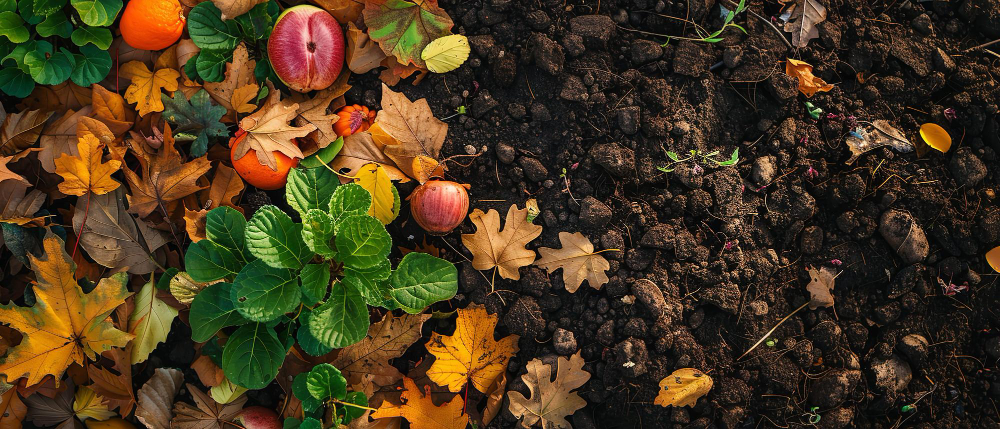The Magic of Composting: Turning Food Waste into Nutritious Fertiliser
In the battle against food waste, composting emerges as one of the most valuable processes. It’s not just a way to reduce the environmental impact of waste but also a powerful tool to create nutrient-rich soil for gardens and farms. At Greenswitch Hubs, we specialise in transforming organic waste into high-quality compost using advanced, scientific methods. Let’s delve into the magic of composting and its benefits.

What is composting?
Composting is nature’s way of recycling organic materials back into the soil in a rich, humus-like material called compost. It’s a process where organic waste, such as food scraps, yard trimmings, and paper, decompose into nutrient-rich soil conditioner.
How does typical composting work in nature?
Composting is a natural process that involves the breakdown of organic matter by microorganisms like bacteria, fungi, and worms. These microorganisms break down the waste into simpler organic compounds, releasing nutrients in the process. The key elements for successful composting are air, moisture, carbon (brown materials like dried leaves or paper), and nitrogen (green materials like food scraps or grass clippings).
Benefits of composting
- Reduces food waste: Composting offers a solution to the significant problem of food waste. Instead of sending food scraps to landfills where they emit harmful greenhouse gases, composting redirects them into a beneficial resource.
- Enriches soil: Compost is a natural fertiliser that enriches soil with essential nutrients, improves soil structure, and enhances water retention. It creates a healthy environment for plants to grow, reducing the need for chemical fertilisers.
- Mitigates pollution: Composting helps combat pollution by diverting organic waste from landfills. When organic matter decomposes in landfills without oxygen (anaerobic decomposition), it produces methane, a potent greenhouse gas. Composting promotes aerobic decomposition, reducing methane emissions.
- Reduces health risks: By diverting waste from landfills, composting reduces the risk of hazardous bacteria infecting humans or animals and prevents potential spread.
- Supports sustainable gardening and agriculture: Compost is the cornerstone of sustainable gardening and farming practices. Incorporating compost into soil improves plant health and yields, fosters biodiversity, and reduces reliance on synthetic fertilisers and pesticides.
What makes Greenswitch Hubs’ composting process different?
At Greenswitch Hubs, we utilise a scientifically advanced composting process that ensures efficiency and high-quality results:
- Aerobic process: Our composting method is predominantly aerobic, favouring efficient bacteria and removing any reliance on worms, insects and fungi making it viable even close to residential areas.
- High-temperature processing: By processing at higher temperatures, we accelerate decomposition and minimise pathogens such as E. coli and Salmonella.
- Low emissions: Our process produces less methane and bad odours, without using toxic or harmful chemicals.
- Compost tea separation: We implement compost tea separation for enhanced moisture control and nutrient management.
- Specialist structures: Our partially enclosed structures allow better control over moisture, pests, and temperature.
- Natural process enhanced: We use oxygen, heat, specialist bacteria, and a unique fruit extract, resulting in superior compost quality with commercial value.
Our facilities are designed for better control
- Concrete floors: Prevent leaching into the ground.
- Reduced access for pests: Semi-enclosed tunnel structures keep out stray birds and predators while maintaining ideal condensation and moisture levels.
- Compliance and safety: We maintain a controlled environment to strictly adhere to national legal guidelines, ensuring our compost is non-hazardous, clean, and healthy.
We rely on knowledge gained at our sister company, Earthpet, which holds the highest permit from the National Department of Forestry, Fisheries, and the Environment for composting hazardous organic waste. General permits typically do not allow the handling of infectious waste, but we ensure all organic waste is treated with care, considering potential hazards like Listeriosis and COVID.
Our commitment to sustainability
We strive to be environmentally conscious wherever possible:
- Solar energy: Powers the majority of our operations and office, effectively minimising our carbon footprint.
- Bio-fuel production: We process used cooking oil into bio-fuel, powering our backup generator, irrigation engine, and customised vehicles and tractors, reducing our dependence on petrol and diesel.
- Animal feed production: We transform, upcycle, and pelletise unspoilt dry food into nutritious animal feed with state-of-the-art equipment.
- Nursery operations: We produce vegetables, trees, and other plants at our Exquisite Gardens and Nursery, creating job opportunities and assisting in food scarcity. Utilising our compost to cultivate these plants brings immense satisfaction and aligns with our broader sustainability goals.

Who are our clients?
Greenswitch Hubs provides a complete solution for the composting of organic waste, serving a variety of clients including:
- Retailers and Delis
- Hotels, Guesthouses, and Restaurants
- Landscapers and Gardeners
We offer specialised bins for collection and delivery, and work with businesses after an initial waste removal audit to develop tailored composting solutions. Our services help clients switch from landfills to sustainable composting quickly and cost-effectively. Additionally, we assure meticulous record-keeping to monitor the organic waste we receive and compost, ensuring the protection of both our clients and ourselves. Opportunities exist for entrepreneurs to own a Greenswitch Hub. Please email info@greenswitch.co.za for more details or call 022 065 0299.
Do your own composting at home
While Greenswitch Hubs offers professional composting services, starting a composting system at home is also a rewarding way to manage food waste. Remember safety first, it is important to educate yourself before attempting composting at home.
Here’s how you can do it:
- Choose a composting method: Decide whether you’ll compost indoors (using a worm bin) or outdoors (using a compost bin or pile).
- Collect organic waste: Gather food scraps like fruit and vegetable peels, coffee grounds, eggshells, and yard waste like grass clippings and leaves.
- Layer materials: Alternate between green (nitrogen-rich) and brown (carbon-rich) materials, keeping the pile moist but not soggy.
- Turn the pile: Aerate the compost pile regularly to speed up decomposition and prevent odours.
- Harvest the compost: Once the compost is dark, crumbly, and earthy-smelling, it’s ready to use. Spread it in your garden beds or mix it with potting soil for container plants.
Composting is a scientifically validated, effective method for managing food waste and nurturing the Earth. At Greenswitch Hubs, we leverage advanced composting techniques to transform organic waste into high-quality compost, benefiting both the environment and our clients. By embracing our professional composting services, businesses can contribute to a sustainable future while reaping the benefits of superior waste management and get the recognition for contributing to positive change. Join us in turning waste into a valuable resource and making a positive impact on our planet.
If you would like to discuss switching to our waste management services in Cape Town,
please contact us.
